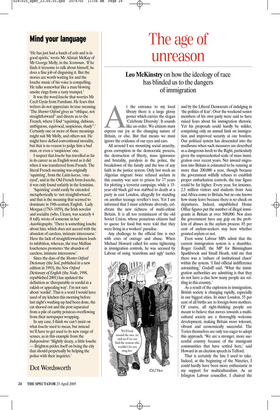Mind your language
‘He has just had a lunch of eels and is in good spirits,’ wrote Mr Alistair McKay of Mr George Melly, in the Scotsman. ‘If he finds it tiresome to talk about himself, he does a fine job of disguising it. But the stories are worth waiting for and the louche music of his voice is compelling. He talks somewhat like a man blowing smoke rings from a rusty trumpet.’ It was the word louche that worries Mr Cecil Gysin from Farnham. He fears that writers do not appreciate its true meaning. ‘The Shorter Oxford gives us “oblique, not straightforward” and directs us to the French, where I find “squinting, dubious, ambiguous, equivocal, suspicious, shady”.’ Certainly one or more of those meanings might suit Mr Melly, and others not. He might have defied conventional morality, but that is no reason to judge him a bad man, or even a ‘suspicious’ one.
I suspect that louche has travelled as far in its career as an English word as it did when it was transferred from French. The literal French meaning was originally ‘squinting’, from the Latin luscus, ‘oneeyed’, and in the Old French form lousche, it was only found unfairly in the feminine.
‘Squinting’ could easily be extended metaphorically to ‘not straightforward’, and that is the meaning that seemed to dominate in 19th-century English. Lady Morgan (1783–1859), the Irish novelist and socialite (who, I learn, was scarcely 4 ft tall), wrote of someone in her Autobiography, ‘There is something louche about him, which does not accord with the abandon of careless, intimate intercourse.’ Here the lack of straightforwardness leads to inhibition, whereas, the true Mellian loucheness promotes ‘the abandon of careless, intimate intercourse’.
Since the days of the Shorter Oxford Dictionary (the Sod, published in a new edition in 1993), the New Oxford Dictionary of English (the Node, 1998, republished 2001) has updated the definition as ‘disreputable or sordid in a rakish or appealing way’. I’m not sure about ‘sordid’. That is a word I would have used of my kitchen this morning before last night’s washing-up had been done, the cat shooed out and the post separated from a pile of earthy potatoes overflowing from their newspaper wrapping.
In any case, I think we can’t insist on what louche used to mean, but instead we’ll have to get used to its new range of senses, as in this example from the Independent: ‘Slightly sleazy, a little louche — Brighton prides itself on being the city that should perpetually be helping the police with their inquiries.’
Dot Wordsworth



















































 Previous page
Previous page